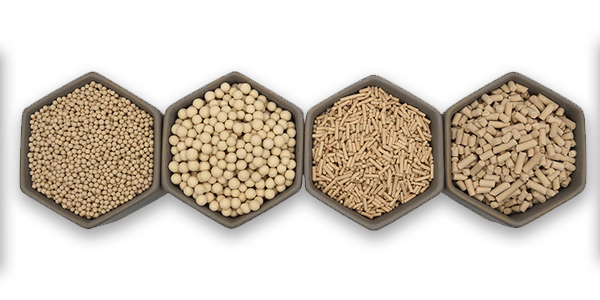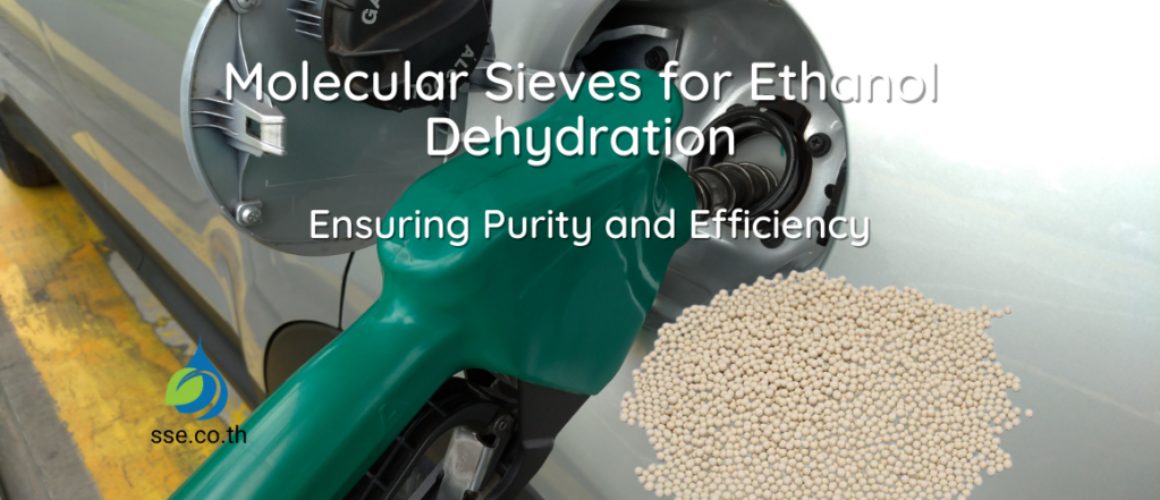Molecular Sieves for Ethanol Dehydration: Ensuring Purity and Efficiency


| Molecular Sieves for Ethanol Dehydration | Key Take-Aways |
|---|---|
| Introduction to Molecular Sieves | Molecular sieves are crucial for ethanol dehydration, removing water to achieve high purity. They are essential for quality and efficiency in fuel-grade ethanol. |
| Importance of Water Removal | Removing water from ethanol prevents corrosion and enhances engine efficiency, ensuring fuel-grade ethanol meets performance and environmental standards. |
| Preferred Use of 3A Sieves | 3A sieves are the ideal choice for ethanol dehydration due to their precise adsorption properties, which target water while leaving ethanol intact. |
| Applications in Ethanol Production | Molecular sieves are used across biofuel, pharmaceutical, and beverage industries, supporting high purity and regulatory compliance in ethanol production. |
| Understanding the Dehydration Process | Ethanol dehydration with molecular sieves ensures high-purity fuel-grade ethanol, suitable for sustainable biofuel applications and efficient fuel performance. |
| Technical Metrics | Molecular sieves offer consistent adsorption efficiency, durability under regeneration, and cost-effectiveness in large-scale ethanol production. |
| Future of Molecular Sieve Technology | Continued innovations in molecular sieve technology promise increased efficiency and sustainability for ethanol production across industries. |
| Conclusion | Molecular sieves are indispensable in producing fuel-grade ethanol, enabling high purity, eco-friendly fuel, and supporting ethanol’s role in sustainable energy. |
Table Of Contents
“In ethanol production, every drop of water removed brings us closer to cleaner, more efficient fuel—where molecular sieves turn sustainability from concept to reality.”
What Are Molecular Sieves and Their Role in Ethanol Dehydration?
| Key Takeaways | Explanation |
|---|---|
| Selective Water Adsorption | Molecular sieves target water molecules without disturbing ethanol, ensuring high purity. |
| Ideal for Fuel-Grade Ethanol | Ensures ethanol meets quality standards for biofuels, pharmaceuticals, and beverages. |
| Superior to Other Drying Methods | High efficiency and effectiveness in achieving nearly anhydrous ethanol. |
Molecular sieves for Ethanol Dehydration are highly specialized adsorbents designed to selectively capture specific molecules, like water, from complex mixtures. In ethanol dehydration, these sieves play a pivotal role in purifying ethanol by removing water molecules. Unlike traditional drying methods, molecular sieves work through adsorption—a process where water molecules are attracted to and held within the precise pore structure of the sieve material. This selective adsorption is crucial for ensuring ethanol purity, making molecular sieves ideal for industries requiring high standards, like biofuel production, the beverage industry, and even pharmaceuticals.


The 3A molecular sieve, in particular, stands out for ethanol dehydration. Its precisely calibrated pore size targets water molecules while allowing ethanol molecules to remain in their natural state, undisturbed by the dehydration process. With the rising demand for clean and efficient fuel sources, molecular sieves are becoming more essential, as they ensure that the ethanol used meets both fuel-grade and regulatory standards for purity.
Understanding the Ethanol Dehydration Process
Ethanol Dehydration Process
| Aspect | Key Takeaway |
|---|---|
| Purpose | Achieve high-purity ethanol by removing water |
| Role of Molecular Sieves | Selectively adsorbs water molecules while leaving ethanol intact |
| Key Benefit | Provides a regenerable, sustainable solution for high-scale ethanol dehydration |
| Related Resource | Further applications in Molecular Sieves Types and Applications |
The ethanol dehydration process is a critical step in producing high-purity fuel-grade ethanol, essential for biofuel and pharmaceutical applications. Achieving purity levels above 99.5% requires advanced dehydration technology, which is where molecular sieves excel due to their selective adsorption of water molecules.
Molecular sieves, especially 3A sieves, are designed with a pore structure that adsorbs water while leaving ethanol molecules untouched. This selectivity enhances the dehydration process’s efficiency, making it a sustainable and renewable option for large-scale fuel-grade ethanol production. For a closer look at molecular sieve applications, visit Molecular Sieves Types and Applications.
The Importance of Water Removal for Fuel-Grade Ethanol
| Key Takeaways | Explanation |
|---|---|
| Prevents Engine Corrosion | Minimizes water content, reducing wear and extending engine lifespan. |
| Enhances Combustion Efficiency | Achieves near-anhydrous ethanol, improving fuel performance. |
| Supports Biofuel Standards | Aligns with regulations and sustainability goals for renewable fuels. |
Water removal is an essential step in producing fuel-grade ethanol, as water can significantly compromise ethanol’s quality and combustibility. Moisture in ethanol can negatively impact engine performance, reduce combustion efficiency, and even cause corrosion in fuel systems. To ensure ethanol is as close to anhydrous (water-free) as possible, industries are increasingly relying on molecular sieves, which enhance both the fuel’s efficiency and longevity.
Fuel-grade ethanol production demands consistency, a requirement well met by molecular sieves’ precise and efficient water removal. This not only benefits the energy sector but also supports biofuel producers in achieving their sustainability goals. Molecular sieves are, therefore, a cornerstone in the biofuel industry’s push for high-performance, eco-friendly fuels.
Why 3A Sieves Are Preferred for Ethanol Dehydration
| Key Takeaways | Explanation |
|---|---|
| Selectivity for Water Molecules | The 3A sieves selectively adsorb water, preserving ethanol integrity. |
| High Dehydration Efficiency | Achieves efficient water removal with minimal ethanol loss. |
| Versatile Across Industries | Suitable for biofuel, pharmaceutical, and beverage sectors requiring high purity. |
In the world of ethanol dehydration, 3A molecular sieves have established themselves as the gold standard due to their selectivity and efficiency. The term “3A” denotes the pore size of the sieve—3 angstroms—which is perfect for targeting water molecules without impacting ethanol molecules. This selectivity is essential for the dehydration process, as it ensures that only the water molecules are removed, preserving ethanol’s integrity and efficacy.
In practice, 3A sieves offer consistent performance and can withstand the high temperatures involved in ethanol production, making them a durable and cost-effective choice for ethanol producers. This preference for 3A sieves is evident across various ethanol applications, from biofuel and pharmaceutical ethanol to beverage-grade ethanol, where purity is paramount.
Applications of Molecular Sieves in Ethanol Production Sectors
| Key Takeaways | Explanation |
|---|---|
| Biofuel Production | Produces fuel-grade ethanol that meets quality and environmental standards. |
| Pharmaceutical Ethanol | Ensures high-purity ethanol suitable for medical applications. |
| Beverage Industry | Retains quality and purity in alcoholic products, meeting industry standards. |
Molecular sieves have a broad range of applications across ethanol production sectors due to their reliability and precision. For instance, high-purity ethanol is essential in biofuel production to meet fuel standards, and molecular sieves provide an efficient solution for this dehydration need, supporting biofuel as a viable, sustainable fuel alternative.


Pharmaceutical ethanol production also benefits from molecular sieves, as purity standards are exceptionally high in the pharmaceutical industry to ensure safe, effective medicines. Additionally, the beverage industry relies on molecular sieves for dehydration to achieve quality standards in alcoholic products, meeting consumer and regulatory expectations.
Technical Advantages and Real-World Applications
Technical Advantages & Applications
| Aspect | Key Takeaway |
|---|---|
| Adsorption Efficiency | High selectivity for water molecules, ensuring ethanol purity |
| Thermal Resilience | Withstands high regeneration temperatures, improving longevity |
| Applications | Used in biofuel, pharmaceutical, and beverage sectors for high-purity ethanol production |
| Related Resource | Ethanol-specific processing in Molecular Sieve Processes |
Molecular sieves provide distinct technical advantages in ethanol dehydration, such as high adsorption efficiency, thermal resilience, and the ability to consistently meet high purity standards. The choice of 3A sieves for this process is deliberate, as these sieves effectively isolate water molecules while withstanding the high temperatures often required for regeneration.
Real-world applications of molecular sieves span biofuel production, pharmaceutical ethanol, and the beverage industry, where the need for ultrapure ethanol is paramount. In each case, sieves improve both the efficiency and quality of production processes. For more on the dehydration process, Molecular Sieve Processes offers valuable insights into achieving ideal ethanol purity.
Technical Metrics That Prove the Value of Molecular Sieves
| Key Takeaways | Explanation |
|---|---|
| Adsorption Capacity | High capacity enables efficient water removal from ethanol. |
| Selectivity for Water | Targets water, preserving ethanol quality in dehydration processes. |
| Thermal Stability | Withstands high temperatures in ethanol production, ensuring reliability. |
Selecting the right molecular sieve for ethanol dehydration depends on technical metrics such as adsorption capacity, thermal stability, and selectivity. Adsorption capacity measures how much water a sieve can hold before it reaches saturation, which directly impacts the sieve’s efficiency. The higher the adsorption capacity, the more effective the sieve will be in removing water, particularly in large-scale ethanol production settings where efficiency is key.
Thermal stability is equally important, as ethanol dehydration processes often occur at high temperatures. Molecular sieves must withstand these conditions without losing performance or structural integrity, ensuring consistent results. Finally, selectivity, particularly for 3A sieves, is a defining metric. By targeting water molecules specifically, 3A sieves prevent ethanol from being adsorbed, preserving its purity and quality.
Future of Molecular Sieves in Ethanol Dehydration Technology
| Key Takeaways | Explanation |
|---|---|
| Enhanced Efficiency | Ongoing advancements aim to improve adsorption capacity and performance. |
| Support for Sustainable Energy | Molecular sieves align with biofuel industry sustainability goals. |
| Innovation in Regeneration | Improved regeneration reduces energy consumption, extending sieve lifespan. |
The future of molecular sieves in ethanol dehydration is promising, with ongoing innovations aimed at enhancing efficiency, sustainability, and adaptability. As the biofuel industry continues to grow, the need for high-performance, renewable fuels like ethanol becomes more critical. Innovations in molecular sieve materials are expected to increase adsorption efficiency, reduce energy requirements, and improve regeneration processes, making them even more suitable for large-scale biofuel production.
Emerging research is exploring advanced molecular sieve designs that enhance water removal capabilities and extend sieve lifespan, providing cost-effective, sustainable options for producers. These advancements position molecular sieves as not only essential for ethanol dehydration today but also as key components in the biofuels of tomorrow.
Frequently Asked Questions
What is the purpose of using molecular sieves in ethanol dehydration?
Molecular sieves selectively adsorb water, helping achieve the high purity required in fuel-grade ethanol production.
Why are 3A molecular sieves preferred for ethanol dehydration?
3A sieves have an optimal pore size that adsorbs water while leaving ethanol molecules, making them ideal for ethanol dehydration.
How do molecular sieves remove water from ethanol?
They use adsorption, where water molecules are trapped within the sieves’ pores, effectively drying the ethanol.
Can molecular sieves be reused?
Yes, molecular sieves are regenerable through heating, making them cost-effective for repeated dehydration cycles.
What is the dehydration process for fuel-grade ethanol?
Dehydration involves removing residual water to reach >99.5% ethanol purity, suitable for fuel and industrial applications.
How are molecular sieves regenerated?
By applying heat or pressure swing techniques, water is released, allowing sieves to regain adsorption capacity.
Is ethanol dehydration essential in biofuel production?
Yes, high-purity ethanol is crucial for biofuels, and molecular sieves help achieve the required purity standards.
Are molecular sieves effective for other types of ethanol, like pharmaceutical-grade?
Absolutely. Molecular sieves are widely used in industries needing high-purity ethanol, including pharmaceuticals and beverages.
How do molecular sieves compare to other dehydration methods?
Molecular sieves offer more precise water removal, faster regeneration, and sustainability advantages over alternatives like distillation.
What makes molecular sieves cost-effective for ethanol dehydration?
Their regenerative capability and selective water adsorption efficiency contribute to reduced operational costs in large-scale applications.
Are there limitations to using molecular sieves in ethanol dehydration?
While effective, molecular sieves require controlled regeneration conditions and may degrade if misused.
What pore size is optimal for ethanol dehydration?
3A molecular sieves are ideal due to their 3 Å (angstrom) pore size, which targets water without adsorbing ethanol.
How does dehydration improve ethanol’s suitability for fuel?
Removing water prevents issues like phase separation in fuel, ensuring higher energy efficiency and performance.
Can molecular sieves be used in portable ethanol dehydration setups?
Yes, smaller, portable setups can also benefit from molecular sieves, especially in niche industries or smaller-scale operations.
Are molecular sieves sustainable?
Yes, their regenerative nature makes them an environmentally friendly option in ethanol dehydration and other applications.
Do molecular sieves impact the final purity of ethanol?
Yes, they are crucial in reaching the 99.5%+ purity needed for fuel-grade and medical-grade ethanol.
What are some real-world applications of molecular sieves in ethanol dehydration?
They are widely used in biofuel production, pharmaceutical ethanol, and beverage industries requiring high-purity ethanol.
How long do molecular sieves last in ethanol dehydration applications?
With proper use and regular regeneration, molecular sieves have a long service life, though it varies based on operational conditions.
Are there any safety concerns when using molecular sieves?
Generally safe, but handling during regeneration needs care to avoid high-temperature hazards.
Where can I learn more about molecular sieve applications in dehydration?
Visit Molecular Sieve Processes for a comprehensive overview of molecular sieve applications.
“By enabling biofuels to compete with traditional energy, molecular sieves aren’t just refining ethanol; they’re refining our approach to a more sustainable and responsible future.”
Conclusion
Molecular sieves have revolutionized ethanol dehydration by providing an efficient, sustainable solution to achieve the high purity required in fuel-grade and pharmaceutical ethanol production. With applications ranging from biofuel to beverage industries, molecular sieves, particularly the 3A variant, have become indispensable in the pursuit of ultra-pure ethanol. To explore the broader benefits of molecular sieves across dehydration applications, The Benefits of Using Molecular Sieves in Gas Drying Applications provides an in-depth perspective on why sieves are preferred across industries.
Molecular sieves are indispensable in ethanol dehydration, ensuring high-purity fuel-grade ethanol for diverse industries. Their role in achieving eco-friendly and high-performance ethanol aligns well with modern sustainability goals. By integrating molecular sieves, ethanol producers benefit from precise water removal and enhanced fuel quality, positioning molecular sieves as a critical technology in the future of biofuels and beyond.
For those interested in exploring the full range of molecular sieve applications, including ethanol dehydration, take a look at our Molecular Sieve Product List and discover which solutions best meet your needs.
If you’d like to learn more about the science behind molecular sieve processes, check out our cornerstone page on A Comprehensive Guide to Molecular Sieves. Additionally, for an in-depth look at ethanol dehydration, the article Optimization, scale-up and cost estimation of dehydration of ethanol using temperature swing adsorption offers valuable insights into the process’s complexities.
ขอบคุณที่ใช้เวลาอ่านบทความของเราเกี่ยวกับการป้องกันความชื้น ทางเราหวังว่าท่านจะได้รับข้อมูลที่มีคุณค่าและเป็นประโยชน์ ทางเรายินดีให้บริการการปรึกษาฟรีเพื่อพูดคุยเกี่ยวกับความต้องการของท่านและให้คำแนะนำเกี่ยวกับวิธีการป้องกันความชื้นที่กำหนดเฉพาะสำหรับคุณ โปรดติดต่อเราที่ 0858124188 เพื่อนัดหมายการปรึกษาหรือเยี่ยมชมร้านค้าของเราเพื่อค้นหาผลิตภัณฑ์ที่ช่วยป้องกันสินค้าของคุณจากความเสียหายจากความชื้น ทางเราหวังว่าจะได้รับข่าวสารจากท่านเร็วๆนี้
